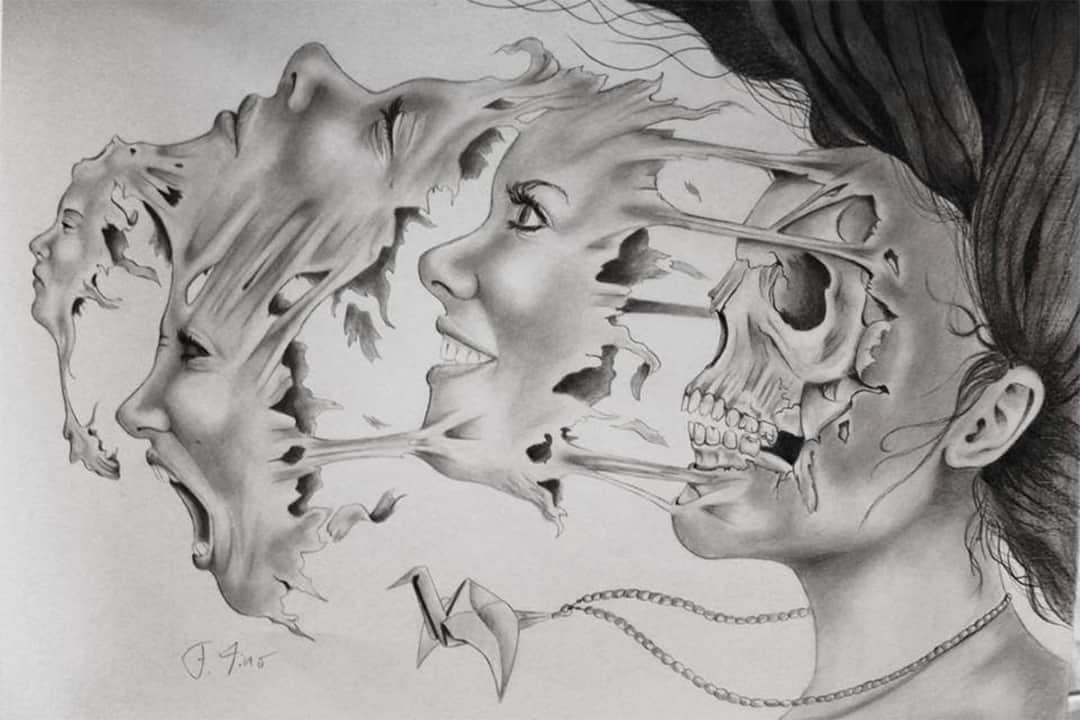“My brain was laboured, my head would spin,
Don’t let me down, don’t give up, don’t give in,
The rain comes down, cold wind blows,
The plans we made are back up on the road,
Turn up my collar, welcome the unknown,
Remember that you said,
‘One day you’ll walk alone.’”
– Excerpt from ‘Addicted to Chaos’ by Dave Mustaine / Megadeth (1994)
Usually, when people are diagnosed by a medical professional with a serious illness, it is a source of sadness and worry. What will happen next? Will this illness destroy me? Or damage me irreparably? What does the future hold?
Well, for me, being Diagnosis Day was a day of great relief – not happiness of course – but a day of knowledge, where a door opened. Until this moment, I had been fighting my whole life – fighting against an enemy which had no name.
Ever since I was a small boy, this enemy, an audible Voice in my head – it always told me how useless I was and it always told me that I was doing everything wrong. The voice became louder as I entered my teenage years and at times, quite frankly, I didn’t want to be alive anymore.
If I smiled at somebody, the voice told me that the person I was smiling at was only pretending to be my friend – they would betray me soon enough. If I did well at school, the Voice told me that my teachers were just being kind because that’s what teachers are meant to do – compliment kids. Every girl who liked me – well, they felt sorry for me. Every good day I had – well, it was just another day closer to the next disaster.
They would betray me sooner or later – they all will.
The Voice was ruthless, malicious and unrelenting – it tried to pull me down under the ocean on good days, and prevented from staying afloat on bad days. The bad days would then become disastrous days very quickly with my mind and heart unravelling rapidly, sometimes within minutes of a seemingly insignificant incident or conversation – cutting my arms with a kitchen knife one day, then ramming a hole in my thigh with my cartridge pen the next. On one occasion, I put my fist through a window and watched the blood drip onto the floor with great satisfaction.
There, voice! Are you happy? Are you happy now? Are you bloody happy?
But The Voice was never happy with me. Never. It always wanted more – more pain, more blood.
I won’t give you all the details (not before the watershed) but my friendships would last a few months, a few weeks and even sometimes a few days. I would love people with all my heart – then detest them to the point where I would refuse to reply to their texts, emails and would even delete their numbers in case I accidentally replied to them. A friend would say something slightly ‘wrong’ and I would lose the will to live. My relationships were all unstable and I have lost count of the number of friends and family members that I have lost due to my erratic emotional state. It is in the dozens, maybe over a hundred now.
Some of these relationship losses still hurt today, years later.
Strangely – on the face of it though, I was doing well. I was becoming very skilled at hiding how I felt from everybody around me. How could I talk to them about feelings which I myself didn’t understand?
I achieved several GCSEs, passed my A Levels and then completed a degree at University before becoming a teacher in my mid-twenties. But deep inside, there was a void, a massive black hole which I couldn’t fill no matter what I achieved academically.
I eventually married – and became a father. I enjoyed both roles of course – but hit a brick wall at around thirty years of age. Despite having everything that I ever wanted – a job which I enjoyed, a lovely wife and a son – I suddenly could not sleep and my nights were filled with thoughts of my own funeral.
Yes, my own funeral.
“Would anybody really miss you?” the Voice kept asking, grinning as he did so. “Would they? Really?”
My wife insisted that I see my GP when I refused to go to work anymore – I did so but was told me that I was ‘depressed’ and that a holiday in Istanbul would help. This didn’t sound like great advice to me as I was not really depressed – nothing in my life was depressing in the slightest.
Plus, the problem was much more deep-rooted, and was unlikely to be solved by Turkish Delights and Baklava.
Soon after, I visited a hypnotherapist who I could not connect with – and a ‘Pir’ who tried to convince me to take a ‘thaweez’ from him which would ‘solve all problems.’
Yeah, whatever. Give my salaam to your jinn by the way.
I gave him a miss – and found myself struggling for answers.
Scrambling around in the dark, I went back to my GP and ended up trying Sertraline and Diazepam for a few weeks. These two medications made teaching utterly impossible. I was half asleep on the days when I went into work – and actually asleep on the days when I could not. How could I teach children how to use a semi-colon if I did not even know what my own name was?
No, medication was not going to do it – not for me.
Eventually, I came across a Psychotherapist – a trained Psychotherapist and Psychologist. Carol sat and she listened for several weeks before venturing to make a diagnosis. I told Carol how I had felt since I was a boy – and the circumstances in which I grew up. Many of the things I told her, I had not told anybody before – not the whole story anyway, just dribs and drabs.
You see, I had the misfortune of growing up in a horrible house – my Dad would beat up my Mum regularly, and his mother would encourage it. I witnessed so much – too much – things I would not wish upon the children of my worst enemies. I saw much of the violence which occurred, and what I did not see, I heard.
My mother attempted suicide when I was seven because my father made her life a ‘living hell’ – again, I was in the house and heard everything.
I hadn’t talked about this stuff before to anyone before I met these counsellors and therapists – not because I am one of those guys who thought I was indestructible or a ‘proper hard man innit bro’ – no, I didn’t talk to anybody about it because I was trying to be Islamic about it all.
“I won’t backbite about my Dad even if he was violent beyond the call of duty.”
But looking back, I was trying to be too holy and carrying that burden, those dozens of horrific memories – it all caught up with me in the end. It was like hit by a train in my own mind.
In the end, after six sessions, my Psychotherapist diagnosed me not with Depression or PTSD which I half-expected – but totally unexpectedly, I was diagnosed with Borderline Personality Disorder.
I had never heard of this – and was extremely confused. What? What’s wrong with my personality? What are you talking about?
But I soon learned from my excellent therapist – and books and documentaries which I found online – that Borderline Personality Disorder is a complex condition characterised by extremely high emotions, a horrible emptiness, unstable relationships and almost relentless suicidal thoughts. The fact that I was alive at all seemed like a minor miracle to me.
The word ‘Borderline’ was originally introduced to describe patients who seemed to be on the border between neurosis and psychosis. Yep, that’s me.
I love people – then hate them – then I love myself – then I want to die – then I want to live and go for a long walk – then I realise its only lunchtime. There’s still ten hours left until I can sleep and rest this maze of a mind of mine. Four seasons – each and every day.
But I am alive – this is what counts.
Nowadays, Borderlines have a suicide rate of around 10% – an alarmingly high figure, a staggering 900 times the percentage of the general population. (0.0109% of the UK population committed suicide in 2015.)
Although shocking to me at first, my own life began to make sense the more I read about the condition. Carol’s Borderline diagnosis was issued primarily because of my high emotional frequency, and this sense that everybody would in the end betray me like my father did. He left me with many horrendous memories – then left us when I was still in primary school before remarrying as if we had never existed. Whilst having a violent parent doesn’t guarantee you will turn out to be Borderline, other factors also played a part, many of which are too complex to even put into words for me.
Borderlines, however, often have an unstable upbringing which means they never feel at home in their own skin. Others may not have unstable lives but develop the condition because of other biological or environmental factors.
Whilst other children may see home as a safe place, children like me who see a lot of domestic violence see it as a kind of war-zone without the tanks. This unstable environment will naturally create unstable individuals. Therefore, I always felt like I was trying to build a house on quicksand.
My Psychotherapist also explained that if your own father is constantly rejecting you (which he did), your mind begins to think ‘if my own father does not like me, nobody truly will’ which then leads to ‘If he/she is being nice to me, this means they are doing it for a short time before they betray me too.’
You don’t trust anybody. I didn’t and still don’t trust many people, if I am honest. I didn’t experience that love and backing which most children do get – and now, I am trying to fly the plane whilst attempting to fix it at the same time – never a good idea.
The more I read though, the more I realised that I am not alone in the Borderline World. The following famous people have been diagnosed with the disorder in their lives: Amy Winehouse, Angelina Jolie, Pete Doherty, Britney Spears, Lindsay Lohan and the legend that is Princess Diana.
Wow – I was in pretty good company, I assured myself.
Interestingly, very few men are diagnosed with Borderline as the list suggests – although if Harvey Two-Face from the Batman comics was real, he would be a Borderline too – because that is how life feels for us – every decision and every relationship is pain-staking, just a flip of a coin, every hour, every minute, every second – anything can happen at any moment because our emotions are always bubbling under the surface.
Every relationship for a Borderline has the potential to become tumultuous and difficult to the point when being on your own all the time is the only safety. But, once I began to understand why my mind was the way it was, I began to stop blaming myself and focussed my attention on trying to get well.
Thankfully, I am up to almost two years of therapy with Carol now – and life is more settled. It’s not pure bliss but it will never be pure bliss in this world.
I once said to my Psychotherapist: “Emotionally, I am 99.9 all the time, a slight thing will take me to 100 and then the explosion will happen.”
Well, I cannot say I am now as cool as cucumber 24-7…. But what I can say is that I am down to 90, sometimes even 85. This might not seem like a big drop but to me, it is. Carol beautifully described me, using cars as a metaphor: “Imad, emotionally, you are not a Mini but a Ferrari.”
This was a lovely phrase (and it made me feel richer than I actually am.)
“I am a Ferrari.” This is now a reminder in my phone just to remind myself of this turn of phrase.
Additionally, I also like to see my emotionality as a potential strength now – when others are in pain, I can feel it too, and I do what I can to help. I don’t want anybody to feel as alone as I have for large chunks of my life.
Experts like the London-based Psychotherapist Imi Lo encourages Borderlines to see their unusually high frequency as being an example of them being ‘emotionally gifted.’ This is a phrase which I fell in love with when I heard it – being emotionally gifted can lead to the greatest empathy for others, the most emotional art and other avenues for creativity.
So, I am always trying to see the silver lining – it’s not always easy but you have to see it, or you will soon become lost in the fog of your own condition. I refuse to allow this to happen. There is too much at stake.
Alhamdulillah – I am now able to take hits and disappointment without becoming devastated or suicidal.
If I want to harm myself (and that thought has become instinctive over the years), I pick up an ice cube and hold it until it melts. This technique means relief without any marks on the body – and it establishes some control back for me, not The Voice.
I am not out of the woods yet – but I keep battling – for myself, my wife and my children.
Being told that I was a Borderline made a lot of things make sense to me – now, I know my enemy.
It is no longer a faceless form in the shadows.
The Voice is still there – but it’s not as loud as it used to be.
It knows it has a fight on its hands.
~ Guest Author




